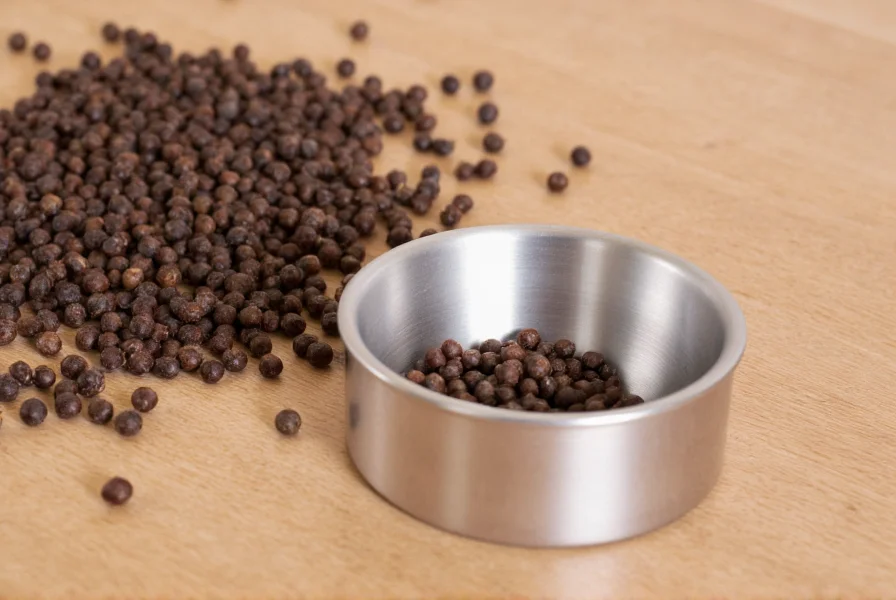Yes, certain types of pepper can be bad for dogs. Black pepper in small amounts is generally safe but can cause digestive upset, while chili peppers containing capsaicin are harmful and should be avoided. Bell peppers (sweet peppers) are actually safe and nutritious for dogs in moderation.
As a pet owner, you've likely wondered whether common kitchen spices like pepper are safe for your canine companion. Understanding the difference between various pepper types is crucial for your dog's health and wellbeing. This comprehensive guide examines scientific evidence and veterinary recommendations to help you make informed decisions about peppers and your dog.
Understanding Different Pepper Types and Their Effects on Dogs
Not all peppers are created equal when it comes to canine consumption. The key is understanding the chemical composition and potential effects of each variety.
Black Pepper: Generally Safe in Small Amounts
Black pepper contains piperine, which gives it its characteristic flavor. While not toxic to dogs, it can cause:
- Mild digestive upset
- Nasal irritation if inhaled
- Temporary discomfort in the mouth
Most dogs will experience only minor symptoms from accidentally consuming small amounts of black pepper. However, large quantities could lead to more significant gastrointestinal distress.

Chili Peppers: Potentially Harmful to Dogs
Chili peppers contain capsaicin, the compound responsible for their heat. This substance affects dogs differently than humans:
- Causes burning sensation in mouth and throat
- Can lead to excessive drooling and pawing at face
- May cause vomiting and diarrhea
- Potentially triggers respiratory distress in severe cases
| Pepper Type | Safety for Dogs | Recommended Action |
|---|---|---|
| Black Pepper | Mildly safe in tiny amounts | Monitor for digestive upset |
| Bell Peppers | Safe and nutritious | Can be given as healthy treat |
| Chili Peppers | Unsafe | Keep away from dogs completely |
| Cayenne Pepper | Unsafe | Seek vet if ingested |
Bell Peppers: A Healthy Treat Option
Contrary to popular belief, bell peppers (also called sweet peppers) are actually beneficial for dogs when given in moderation. They provide:
- Vitamin A for healthy vision
- Vitamin C as an antioxidant
- Fiber for digestive health
- Low calories for weight management
Red bell peppers contain the highest concentration of nutrients. Always serve them raw or steamed without seasoning for maximum safety.
Symptoms of Pepper Ingestion in Dogs
If your dog consumes inappropriate types of pepper, watch for these symptoms:
Mild Reactions (Typically from Black Pepper)
- Temporary sneezing or nasal irritation
- Mild stomach upset
- Increased thirst
- Occasional lip licking
Severe Reactions (Typically from Chili Peppers)
- Excessive drooling
- Pawing at mouth
- Vomiting and diarrhea
- Difficulty breathing
- Signs of abdominal pain
- Restlessness or agitation
What to Do If Your Dog Eats Pepper
Immediate action can prevent complications when your dog ingests pepper:
- Identify the pepper type - This determines your response
- Remove any remaining pepper - Prevent further consumption
- Offer water - Helps dilute mild irritants like black pepper
- Monitor symptoms - Keep track of any changes
- Contact your veterinarian - Especially for chili pepper ingestion
For chili pepper ingestion, do not induce vomiting unless specifically instructed by a veterinarian. The vet may recommend milk or yogurt to help neutralize the capsaicin, but professional guidance is essential.
Preventing Pepper-Related Issues with Your Dog
Proactive measures can keep your dog safe from pepper-related problems:
- Store spices securely out of reach
- Avoid seasoning dog food with human spices
- Train your dog with "leave it" commands
- Be cautious when cooking with peppers
- Supervise your dog in gardens where peppers may grow
Healthy Vegetable Alternatives for Dogs
If you're looking for safe, nutritious treats for your dog, consider these vet-approved options:
- Cucumber slices (hydrating and low calorie)
- Carrot sticks (great for dental health)
- Green beans (excellent for weight management)
- Pumpkin (cooked, unsweetened - aids digestion)
- Zucchini (steamed or raw in small pieces)
When to Consult Your Veterinarian About Pepper Ingestion
While minor black pepper consumption rarely requires veterinary attention, contact your vet immediately if your dog:
- Ingested significant amounts of chili peppers
- Shows persistent vomiting or diarrhea
- Has difficulty breathing
- Appears to be in pain
- Exhibits unusual lethargy
- Has blood in vomit or stool
When calling your vet, be prepared to provide details about what type and how much pepper your dog consumed, when it happened, and any symptoms you've observed. This information helps them provide the most appropriate guidance.










 浙公网安备
33010002000092号
浙公网安备
33010002000092号 浙B2-20120091-4
浙B2-20120091-4